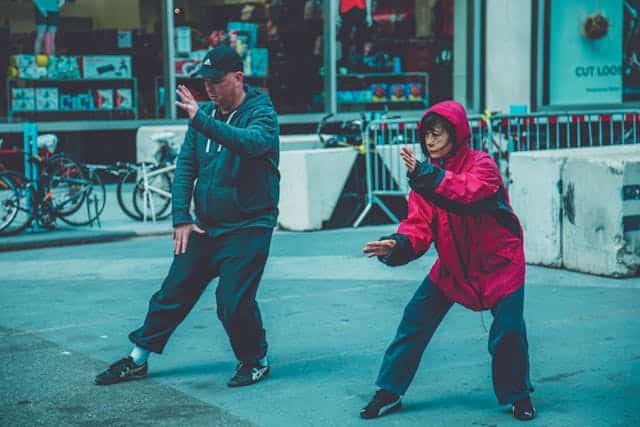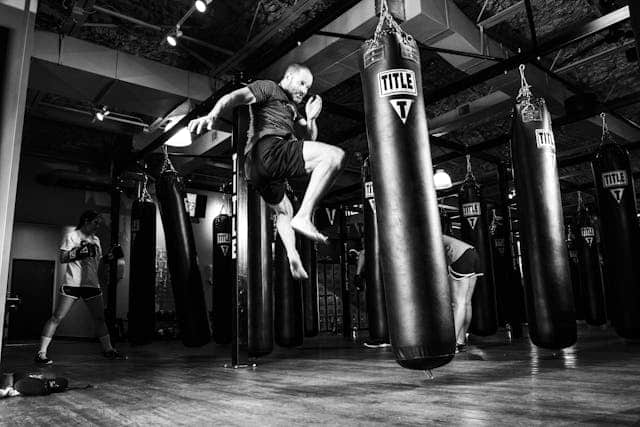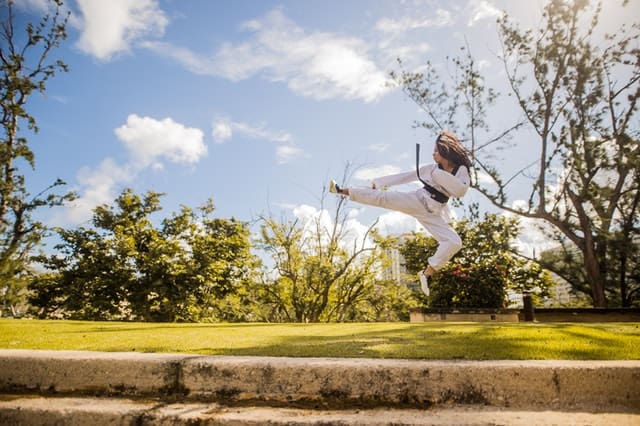Top 10 Health Benefits of Martial Arts
From improving cardiovascular health to boosting mental focus, the health benefits of martial arts extend to nearly every area of life.
Therefore, martial arts are far more than just combat techniques and self-defense; they are a holistic form of training that enhances both body and mind.
In fact, according to data from ZipDo, over 10 million Americans actively participate in martial arts, highlighting the growing popularity of these practices as both fitness and wellness tools.
This centuries-old discipline blends aerobic conditioning, resistance training, flexibility, and mindfulness, making it one of the most well-rounded forms of exercise available.
Whether you are seeking weight loss, stress management, or greater self-confidence, martial arts provide unique advantages that traditional workouts often overlook.
By exploring the top health benefits of martial arts, you can better understand why this ancient practice continues to thrive in modern fitness culture and how it can transform your physical, mental, and social well-being.
What is Martial Arts Training?

Martial arts training is the structured practice of combat-based systems that blend physical techniques, mental discipline, and personal development.
While many people associate martial arts only with fighting or self-defense, modern martial arts schools emphasize a much broader scope, including building strength, cardiovascular endurance, flexibility, focus, and confidence.
Training sessions often include a mix of striking techniques (punches, kicks, elbows, knees), grappling or ground-based skills (throws, holds, submissions), and conditioning drills that challenge both aerobic and anaerobic fitness.
Beyond physical techniques, martial arts practice incorporates mindfulness, respect, and discipline, making it as much a lifestyle as it is a workout.
From traditional styles like karate, taekwondo, and kung fu to modern combat sports such as Brazilian jiu-jitsu, kickboxing, and mixed martial arts (MMA), each discipline has unique philosophies and training methods.
What unites them all, however, is the ability to improve overall health and well-being while teaching valuable life skills that extend far beyond the dojo or gym.
What are the Benefits of Martial Arts Training?

Martial arts training has become more accessible than ever, with options ranging from traditional dojo classes to online boxing classes and body combat workouts.
Unlike many fitness programs, most martial arts styles require little or no equipment, making them a practical choice for beginners and experienced athletes alike.
For those hesitant about contact, it’s important to note that not all martial arts involve sparring or full-contact fighting.
Many classes focus on fitness, technique, and mental discipline without the risk of being hit.
With so many approaches available, anyone can explore the health benefits of martial arts and find a style that matches their goals for physical fitness, self-confidence, and overall well-being.
1.) Improved Body Composition
If you want to improve your endurance, flexibility, and cardiovascular fitness, martial arts is a very effective exercise option for you.
Unlike other forms of training, results come fast from martial arts training. Due to the improved dexterity of your legs and entire body, you will see the difference in the mirror right away.
Martial arts training burns a ton of calories because of the pace and intensity of the class, and you will sculpt your body because of the unique movements you will practice.
Overall, martial arts is a great way to get rid of excess pounds and decrease your body fat, while maintaining a strong body
After a few training sessions and noticing the improvements in your body, you will reach a point that you cannot wait to return to the next class! Your brain and body will appreciate your new lifestyle.
2.) Develop Self Defense Skills
Learning self-defense skills is one of the main reasons some people practice martial arts, but it is a bonus of using martial arts training as a form of fitness.
Understanding basic fighting principles and having the ability to protect yourself will help you feel more secure on a dark road at night or any other precarious situation.
Certain martial arts are even better for self-defense than others.
For example, Krav Maga is a military self-defense and fighting system that was developed for the Israel Defense Forces and Israeli security forces.
It is derived from a combination of techniques including boxing, wrestling, aikido, judo, and karate- along with realistic fight training.
Krav Maga is especially useful to learn for women or smaller individuals who are looking to learn how to defend themselves.
You can find you find a great Krav Maga class in Toronto, New York, London, or anywhere in between which will improve your ability to defend yourself!
3.) Increased Self-Confidence
Improving your self-esteem and self-confidence is one of the most important health benefits of training a martial art.
Simply looking in the morning in the mirror will no longer make you nervous if you are trying to lose weight.
Want to know how to lose weight fast? Practice martial arts!
Your build will quickly develop how you want it, and think about how you will feel walking around, looking in the mirror and seeing a strong and toned core!
You will feel very good about yourself because you will have earned the body you have!
Not only will you have a better-looking body, but you will be in more control of your body as well.
Martial arts also helps improve your confidence by helping you feel in control and in power of your body and life!
4.) Enhanced Cardiovascular Health
Engaging in martial arts is a powerful way to boost cardiovascular health.
This form of exercise demands sustained physical activity, which challenges the heart and lungs, leading to improved cardiovascular endurance and strength.
As practitioners navigate through various techniques and drills, their heart rate increases, fostering better blood circulation and heart function.
Over time, this heightened cardiovascular activity can lead to a reduced risk of heart disease, lower blood pressure, and improved heart health.
The dynamic nature of martial arts, encompassing both aerobic and anaerobic exercises, ensures a comprehensive cardiovascular workout, making it an effective way to maintain and enhance heart health.
5.) Improved Strength and Muscle Tone
Martial arts training is renowned for its ability to develop strength and muscle tone.
Unlike workouts that focus on isolated muscle groups, martial arts provide a full-body exercise regime.
Each session involves a combination of movements that work various muscles simultaneously.
From punches and kicks to blocks and grapples, these exercises target and strengthen core muscles, arms, legs, and the back.
This holistic approach not only builds muscle but also enhances overall physical strength.
As practitioners progress, they often notice an improvement in muscle definition and tone, contributing to a stronger, more resilient physique.
The strength gained through martial arts is functional, aiding in daily activities and promoting long-term physical health.
6.) Improved Focus & Concentration
Martial arts training extends far beyond the mastery of physical skills and techniques; it is equally a journey towards mental clarity and focused concentration.
This discipline teaches practitioners to clear their minds, enabling a laser-like focus on the task at hand.
The mental rigors of martial arts are rooted in the principles of mindfulness and present-moment awareness, which are critical for achieving peak performance.
A pivotal study published in the Journal of Applied Developmental Psychology illuminates this benefit.
It found that after a three-month martial arts program, participants exhibited significant improvements in cognitive and affective self-regulation, prosocial behavior, classroom conduct and even excelled in a mental math test compared to a non-practicing group.
This research underscores the profound impact martial arts can have on enhancing concentration and cognitive function.
The correlation between physical and mental fitness in martial arts is remarkable.
As practitioners develop greater physical harmony and awareness, they simultaneously hone their mental concentration.
This synergy leads to improvements not just within the confines of martial arts training but extends to all facets of life, enhancing personal and professional capabilities.
7.) Stress Relief
Martial arts serve as an exceptional outlet for alleviating the stress and frustrations inherent in everyday life and serves as a natural remedy for stress.
More than just a physical exercise, it’s a discipline that teaches practitioners how to manage stress effectively as it arises.
The combination of intense physical activity and mental discipline required in martial arts makes it a unique form of stress relief.
A study published in the European Journal of Human Movement emphasizes the dual psychological and physiological benefits of regular exercise, especially activities like martial arts that integrate mindful movements.
Martial arts demand energy expenditure coupled with high levels of concentration, offering an innovative approach to enhancing both physical and mental well-being.
Regular practice can elevate mindfulness levels, positively impacting stress management, quality of life, and overall well-being.
Engaging in martial arts allows for a temporary escape from daily stressors.
The focus required in training sessions or sparring matches channels your energy and concentration, steering your thoughts away from external stressors.
This immersive experience not only pumps the heart and energizes the body but also clears the mind, providing a mental respite.
The physical exertion involved in martial arts releases endorphins, the body’s natural mood lifters, further contributing to stress reduction.
As a result, martial arts not only offer immediate stress relief but also equip practitioners with long-term strategies for managing stress in their daily lives.
8.) Improved Self-Control
Students learn to develop control over their bodies through martial arts classes; and once they learn to control their body, the mind follows.
When they are nervous and want to react, improved self-control will stop them.
Students must work hard to develop speed, strength, time, flexibility and coordination in martial arts classes, and these skills are important for many facets of life.
9.) Better Flexibility & Balance
The journey through martial arts is not just about self-defense or physical strength; it’s also about achieving remarkable flexibility and balance.
As you delve deeper into martial arts training, you will likely experience the most refined balance skills of your life.
This discipline emphasizes the importance of stability, whether it’s balancing on one leg or maintaining poise in dynamic movements.
This focus on balance is integral not only for martial arts performance but also for overall body health and injury prevention.
Martial arts training is especially beneficial for specific age groups, such as growing children and the elderly, who can greatly benefit from improved balance and flexibility.
A study published in Pediatric Exercise Science sheds light on this aspect.
It observed significant improvements in quadriceps flexibility and balance (especially with eyes closed) among children practicing karate.
These enhancements in flexibility, balance, and strength are crucial for preventing sports injuries during the crucial years of physical development.
Similarly, for the elderly population, martial arts can play a vital role in maintaining physical fitness and preventing falls.
A study in the Journal of Physical Therapy Science highlighted the benefits of Ving Tsun, a form of martial arts, as a potential fall-prevention exercise.
It can help in maintaining general physique, balance, and confidence among older adults.
This aspect of martial arts is particularly important as it aids in preserving independence and quality of life in the later years.
Through regular practice, martial arts not only improve physical abilities but also contribute significantly to mental well-being.
The discipline and concentration required to achieve and maintain balance in martial arts carry over into daily life, enhancing overall coordination and spatial awareness.
This makes martial arts an invaluable practice for enhancing bodily control and poise, irrespective of age.
10.) Social Interaction and Community Development
Joining a martial arts class offers much more than learning self-defense or physical conditioning; it opens the door to vibrant social interaction and the cultivation of a supportive community.
Martial arts schools are melting pots of individuals from diverse backgrounds, united by a common interest.
This environment fosters a sense of belonging and camaraderie among practitioners.
The structure of martial arts training inherently encourages teamwork and mutual respect.
As students learn and practice together, they form bonds that often extend beyond the dojo or training hall.
These relationships are grounded in shared experiences, challenges, and achievements, creating a strong sense of community.
For many, the martial arts community becomes a significant social network, offering friendship, support, and encouragement.
Moreover, martial arts classes are often intergenerational, bringing together people of different ages and walks of life.
This diversity enriches the learning experience, as each individual brings unique perspectives and insights.
The respectful and inclusive atmosphere typical of martial arts training makes it an ideal environment for fostering social connections.
In addition to the physical and mental health benefits, the social aspect of martial arts can be particularly impactful.
It provides a space for individuals to connect, share experiences, and support each other’s growth.
Whether it’s through partnering in drills, offering encouragement during challenging techniques, or celebrating each other’s progress, the bonds formed in martial arts classes are often deep and enduring.
For those looking for a fulfilling way to enhance their social life while improving their physical and mental well-being, martial arts classes offer a unique and rewarding opportunity.
The sense of community and friendship found in martial arts can be a powerful source of motivation and enjoyment, making the practice a holistic and enriching experience.
How to Start Martial Arts Training for Health Benefits

Getting started with martial arts training is simple and beginner-friendly. The first step is to gather basic equipment, including a martial arts uniform and shoes, and protective gear like a mouthguard or groin protector.
Once you have the essentials, look for a martial arts or MMA (mixed martial arts) gym that offers classes suited to your skill level.
Many gyms teach traditional styles like karate, taekwondo, or Brazilian jiu-jitsu, while others focus on hybrid systems such as Jeet Kune Do, which was developed by Bruce Lee from techniques including Muay Thai, Wing Chun, fencing, and boxing.
Choosing between a single discipline and MMA depends on your goals: practicing one style builds mastery in specific techniques, while MMA offers greater flexibility but less specialization.
Whichever path you choose, martial arts training is a proven way to boost fitness, confidence, and overall health.
Final Thoughts: Is Martial Arts Training Good for You?

Martial arts training is one of the most well-rounded forms of exercise, blending strength, endurance, flexibility, and mindfulness into a single practice.
Beyond physical fitness, it teaches self-defense, discipline, and stress management while developing confidence and community.
Whether you choose a traditional style like karate or taekwondo, or explore MMA and modern hybrid systems, the health benefits of martial arts extend to every part of life.
With consistent practice, you can improve your body composition, sharpen your mind, and build lasting resilience.
If your goal is to stay active, reduce stress, or find a more engaging way to exercise, martial arts training is a proven path to better health and long-term well-being.
This website does not provide medical advice. This website site does contain affiliate links, and purchases may earn a commission.
Read my Medical Disclaimer, Review Disclaimer, and Publishing Policies for more details. Use of this site indicates acceptance of these terms.



